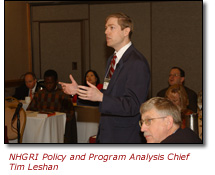 |
NHGRI Policy Roundtable Summary
The Future of Genomic Medicine: Policy Implications for Research
and Medicine
Bethesda, Md.
November 16, 2005
 On November 16, 2005, the Policy and Program Analysis Branch (PPAB) of the
National Human Genome Research Institute (NHGRI) convened a roundtable to examine
what core policy issues the NHGRI should work on to help ensure that our greatly
expanding knowledge of human genomics is translated into improved health care.
The NHGRI Policy Roundtable brought together 19 representatives from government,
research, advocacy, health care, insurance, industry, and academia. On November 16, 2005, the Policy and Program Analysis Branch (PPAB) of the
National Human Genome Research Institute (NHGRI) convened a roundtable to examine
what core policy issues the NHGRI should work on to help ensure that our greatly
expanding knowledge of human genomics is translated into improved health care.
The NHGRI Policy Roundtable brought together 19 representatives from government,
research, advocacy, health care, insurance, industry, and academia.
One of the NHGRI's major goals is to enhance health care in the USA through
the integration of genomic medicine into mainstream medical practice. Genomic
medicine is a powerful way to tailor health care at the individual level by
using patients' genomic information. By identifying the genetic factors associated
with disease, it is possible to design more effective drugs; to prescribe the
best treatment for each patient; to identify and monitor individuals at high
risk from disease; and to avoid adverse drug reactions. Various NHGRI research
programs are already helping to realize the promise of genomic medicine, but
many important advances in genomic medicine will only occur if we effectively
address matters of public policy.
In tandem with important scientific advances, the NHGRI is already addressing
many policy issues related to genomic medicine. The institute continues to advocate
for comprehensive federal protections from genetic discrimination by employers
or health insurance providers for all: NHGRI believes that such protections
are essential to protect Americans from potential abuse of genomic medical information.
The NHGRI is also monitoring intellectual property practices related to genomic
medicine. Responding to widespread concerns that a "thicket of patents"
may slow the incorporation of genomics into the clinical setting, the NHGRI
commissioned the National Academies of Sciences to examine the impact of intellectual
property [nationalacademies.org] on advances in genomic medicine and is currently planning how best
to respond to the report's recommendations. The NHGRI is also working with other
interested parties to draw up guidelines regarding the direct marketing of genetic
tests to the public. The Roundtable was convened to discuss what further action
PPAB should take on these and other issues.
Morning Session
 The session began with opening remarks from Francis Collins, NHGRI Director,
and Tim Leshan, Chief of PPAB. Participants then role-played a hypothetical
scenario in which 'Brad,' a young Biotech executive in the year 2015, visits
his doctor and has his genome sequenced to analyze whether he is predisposed
to heart disease. Moderator Eric Green, the Director of the NHGRI Division of
Intramural Research, revealed the scenario in stages: describing how Brad got
his genome sequenced through a referral to a genetic counselor; how he found
out that he had three alleles predisposing him to an increased risk of heart
disease at a young age; how he was recruited to a drug trial testing the drug
"Relaxin," designed to reduce the risk of a heart attack in people
with his genetic profile; and how, through taking Relaxin, he lived to old age.
At each stage, the moderator challenged participants to offer their perspectives
about a wide range of policy issues from the viewpoints of their own professions. The session began with opening remarks from Francis Collins, NHGRI Director,
and Tim Leshan, Chief of PPAB. Participants then role-played a hypothetical
scenario in which 'Brad,' a young Biotech executive in the year 2015, visits
his doctor and has his genome sequenced to analyze whether he is predisposed
to heart disease. Moderator Eric Green, the Director of the NHGRI Division of
Intramural Research, revealed the scenario in stages: describing how Brad got
his genome sequenced through a referral to a genetic counselor; how he found
out that he had three alleles predisposing him to an increased risk of heart
disease at a young age; how he was recruited to a drug trial testing the drug
"Relaxin," designed to reduce the risk of a heart attack in people
with his genetic profile; and how, through taking Relaxin, he lived to old age.
At each stage, the moderator challenged participants to offer their perspectives
about a wide range of policy issues from the viewpoints of their own professions.
Afternoon Session
 Moderator Kathy Hudson, Director of the Genetics and Public Policy Center, invited
the roundtable participants and members of the audience to comment on the themes
that had emerged during the morning session.
The group discussed which policy issues are most crucial for the future of genomic
medicine.Participants agreed that the NHGRI, together with other agencies,
has an important role to play in shaping policies related to the integration
of genomic medicine into clinical practice. They identified several issues that
would benefit from NHGRI leadership or participation. The discussions provided
substantive analysis to help the NHGRI determine its policy focus priorities
and the best means to accomplish its goals. Moderator Kathy Hudson, Director of the Genetics and Public Policy Center, invited
the roundtable participants and members of the audience to comment on the themes
that had emerged during the morning session.
The group discussed which policy issues are most crucial for the future of genomic
medicine.Participants agreed that the NHGRI, together with other agencies,
has an important role to play in shaping policies related to the integration
of genomic medicine into clinical practice. They identified several issues that
would benefit from NHGRI leadership or participation. The discussions provided
substantive analysis to help the NHGRI determine its policy focus priorities
and the best means to accomplish its goals.
Discussion Themes from the Morning Session:
- Currently, the public is not fully aware of the importance of family medical
history, and many doctors are not clear about how to interpret the family
history of a patient who has had the initiative to collect it. Similarly,
it is not clear how a doctor would treat patients differently based upon access
to their genome sequences. Greater scientific expertise is needed to convey
accurate and complete genomic information to individuals and to the general
public. An increased public awareness and more scientifically aware policy
makers would allow for more thoughtful and complete analyses of important
science and health care issues.

- We may be able to have our genomes sequenced for $1000 in 10 years time.
Uptake of this type of technology may be slowed without legal protections,
as privacy and discrimination concerns may cause patients to be resistant
to genomic technology. For example, genetic information could have negative
consequences for a patient's health care insurance, particularly if they are
seeking individual coverage rather than coverage through their employer's
group coverage. This potential for abuse may cause doctors to feel opposing
pressures to omit sensitive medical information from medical records to protect
their patient and also to include such information in the medical records
to protect themselves from liability. Passing federal legislation prohibiting
genetic discrimination is essential to the future development and utility
of genomic medicine. Even with such legislation, results from genome sequencing
may still affect the ability of individuals to acquire life, long-term care,
and disability insurance.
- The different responsibilities of the primary care physician, genetic counselor,
and medical geneticist need to be examined and perhaps redefined. Currently,
there are only ~ 2,000 genetic counselors in the United States. If genetic
counselors are to play a central role as genomic medicine is integrated into
clinical practice, there is a need for more genetic counselors. At the same
time, other health care providers will need to learn more genomics so they
can better inform and treat their patients. The standard practice of care
for doctors with regard to genomic medicine needs to be defined. And, if patients
are expected to make lifestyle changes based on information about their genetic
risk factors, appropriate support needs to be in place to help them.
- A "thicket of patents" for gene mutations related to disease also
threatens either to derail progress or to allow biotechnology companies in
other countries to develop products more rapidly than US. companies.
- Our ability to enable health care providers to interpret the results of
genome sequence, and recommend preventative treatments, is also likely to
lag behind our ability to develop methods to generate accurate genomic sequence
cheaply. However, insurance is unlikely to cover such sequencing in the absence
of clinical utility. Even if there is clear clinical utility, insurance may
still be reluctant to bear the coverage costs. Government payments for genome
sequencing or incentives for insurance companies to provide coverage are possible
remedies.
- Regulating individualized genome sequencing is new ground for the FDA. The
FDA has to design regulations for many different biomarkers with varying levels
of clinical utility. Whether FDA even regulates this activity will be dependent
upon whether the sequencing is performed by clinical research laboratories
or by private companies.
- Pharmacogenomics companies face many challenges. They must comply with Institutional
Review Board requests, develop products that are only marketable to a subset
of the public, and, possibly, have to develop and market products without
patent protections. There are 5000 biotech companies, but to date only 200
have launched a product. Policymakers need to address how to provide incentives
that enable product development.
- The estimates of patients' risk of disease based on their genomic profiles
will change as research advances, and will be greatly complicated by the eventual
availability of low-cost whole genome sequencing. It will be challenging to
communicate these changes in estimated risk to patients.
- The communication of genome sequencing results to patients raises ethical
difficulties. If health care providers order genome testing to assess risk
for one disease, the results may also have information about risk for other
diseases. It is unclear how much of this information they should communicate
to patients. Should they only give information for which there is clinical
utility, or is it unethical to withhold any information related to patient
health? Perhaps the patient only wishes to know information directly related
to the reason for his or her genome sequencing. The responsibility of the
sequencing laboratory to draw attention to gene variants associated with increased
risk of disease is unclear, and the threshold for the clinical validity of
an association between a gene variant and disease risk is undefined.
- Institutional Review Boards that oversee large cohort studies involving
genomics face many challenges and concerns. Such studies often involve institutions
spread across the U.S. Each state has different laws and its own IRB system.
Some laws relate to HIPAA and some do not. It is, therefore, very challenging
to approve these large studies. But these population-based studies are essential
to determine associations between gene variants and diseases, and to examine
the efficacy of integrating genomics into medicine.
Possible NHGRI activities:
- Intellectual Property: The ever-increasing number of patents related to
mutations associated with disease threatens to prevent routine patient genome
sequencing from becoming a reality. An "anti-commons land-grab"
approach threatens to limit the advance of personalized medicine. The NHGRI
needs to develop recommendations that overcome the issues associated with
the "thicket of patents."
- Regulation of genetic tests: For companies to develop genetic tests and
associated medicines, they need to understand the regulations that will govern
FDA approval for their clinical use. The NHGRI should encourage greater dialogue
between agencies to clarify the current approval procedure, and to recommend
changes appropriate for genomic medicine products.
- Privacy and consent: The NHGRI should collaborate with others to draw up
guidelines for Institutional Review Boards overseeing large cohort studies
and banking of genetic material, and for the informed consent of subjects
of such studies. They should also work with other agencies to publish "duty
to inform" recommendations to guide researchers on which information
to tell research participants, and which to withhold.
- Economics of genomic medicine: The NHGRI needs to work with health economists
to understand better the economic factors that will determine whether and
how genomics is translated into clinical practice. What will be financial
costs and societal benefits of integration of genomics into health care? Will
society ultimately save money through increased productivity of a healthier
population? How can we ensure that all benefit from genomic medicine and that
it is not exclusive?
- Reevaluating the health care paradigm in genomic medicine: The NHGRI should
engage with other agencies to evaluate what changes to the current health
care system would optimize the benefits of genomic medicine for the American
people, and to define roles for different health care providers. Genomic medicine
will demand that patients make informed decisions about whether to have a
genetic test, whether to take a genomic based drug, and what lifestyle changes
to make to reduce their risks of contracting a disease. Currently, it is not
clear whose responsibility it is to help them make those choices. Most health
care professionals have insufficient knowledge about genomic medicine and
there are too few geneticists and genetic counselors.
- Genetic non-discrimination: The NHGRI should continue to advocate for federal
legislation that prevents genetic discrimination by employers and health insurance
providers. It should also fund ELSI grants to study current state legislation,
which currently represents the only protection against genetic discrimination.
NHGRI should fund research to study the use of genetic information in life
and disability insurance and its impact on coverage for individuals.
- Non-medical applications of genomics: Genomics is being used for purposes
other than the advance of medicine. The NHGRI should examine the scope and
ethics of such uses, and assess the impact on genomic medicine.
- Reimbursement by health insurers: The NHGRI should examine the issue of
reimbursement by health insurance companies for clinical genomics services
including genetic testing. Should clinical utility be the benchmark for whether
health insurance should pay? How would clinical utility of whole genome sequencing
be defined? Does government have a role in contributing to coverage of sequencing
services?
- Design of large cohort studies, validation of tests and products: The NHGRI
should issue guidelines for the design of disease association studies that identify
genetic markers linked to specific diseases. It should also issue guidelines
for the validation of a test or product related to genomics.
Participants:
Christopher Austin, M.D., Translational Scientist, NHGRI
Les Biesecker, M.D., Genetic Disease Research Branch, NHGRI
Vence Bonham, J.D., Chief, Education and Community Involvement Branch, NHGRI
Francis Collins, M.D., Ph.D., Director, NHGRI
Craig Czarsty, M.D., Clinical Practitioner
Phyllis Frosst, Ph.D., NHGRI
Felix Frueh, Ph.D., Clinical Pharmacology and Bioinformatics, FDA
Eric Green, M.D., Ph.D., Scientific Director, NHGRI
Steven Gutman, M.D., Director, Division of Clinical Laboratory Services, FDA
Alan Guttmacher, M.D., Deputy Director, NHGRI
M.K. Holohan Quattrocchi, J.D., NHGRI
Kathy Hudson, Ph.D., Director, Genetics & Public Policy Center
Tim Leshan, M.P.A., Chief, Policy and Program Analysis Branch, NHGRI
Tracy Lieu, M.D., M.P.H., Center for Child Care Health Care Studies, Harvard
Brad Margus, CEO, Perlegen Sciences, Inc.
Brian Munroe, Vice President, Millenium Pharmaceuticals, Inc.
P. Pearl O'Rourke, M.D., Director, Human Research Affairs at Partners HealthCare Systems, Inc.
John Porter, Former Congressman, Health law expert
Gurvaneet Randhawa, M.D., Agency for Healthcare Research and Quality
Laura Lyman Rodriguez, Ph.D., NHGRI
Cheryl Scacheri, M.S., C.G.C., Genetic Counselor, GeneDx, Inc.
Jeff Schloss, Ph.D., Program Director, Technology Development, NHGRI
Derek Scholes, Ph.D., NHGRI ASHG Fellow
Frank Swain, J.D., Baker & Daniels
Lawrence Sung, J.D., University of Maryland School of Law
Larry Thompson, Chief, Communications and Public Liaison Branch, NHGRI
David Valle, M.D., The Johns Hopkins University School of Medicine
David Veenstra, Ph.D., Health Economist, University of Washington
Vivian Ota Wang, Ph.D., Program Director, Ethical, Legal and Social Implications,
NHGRI
Janet Warrington, Ph.D., Vice President, Affymetrix, Inc.
Robert Wells, Affymetrix, Inc.
Ben Wilfond, M.D., Head, Bioethics and Social Policy Unit, NHGRI
Last Reviewed: August 4, 2008
|
 |

